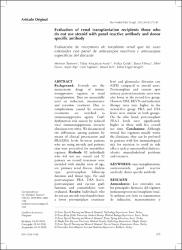Evaluation of renal transplantation recipients those who do not use steroid with panel reactive antibody and donor specific antibody

Göster/
Tarih
2021Yazar
Tanrısev, MehmetKılıçaslan Ayna, Tülay
Çolak, Hülya
Yılmaz, Banu
Ersan, Sibel
Alp, Alper
Tuğmen, Cem
Sert, İsmail
Engin Sevgili, Bahar
Üst veri
Tüm öğe kaydını gösterÖzet
Background: Steroids are the mainstream drugs of immu-nosuppressive regimen in renal transplantation. They are successfully used on induction, maintenance and rejection treatment. Due to complications caused by steroids, treatments are switched to immunosuppressive agents. Graft dysfunction risk caused by reduced total immunosuppression disturbs clinicians very often. We documented the differences among patients by means of clinical presentation and PRA/DSA levels between patients who are using steroids and patients that were prescribed for steroid-free regimen. Methods: 82 individuals who did not use steroid and 52 patients on steroid treatment were included with similar rates of age, sex, primary renal disease, dialysis type, posttransplant follow-up duration and donor type. Pre and posttransplant PRA, DSA levels, posttransplant and current graft function and comorbidities were evaluated. Results: Individuals who do not use steroids were found to have a lower posttransplant creatinine level and glomerular filtration rate (GFR) compared to steroid users. Posttransplant and current spot urinary protein/creatinine rates were also lower in the steroid-free group. However DM, BKVN and induction therapy rates were higher in the steroid-free group. PRA and DSA levels were similar in both groups. On the other hand, posttransplant PRA-I levels were significantly higher in those with less steroid use time. Conclusions: Although steroid free regimens usually worry the clinicians, they can be preferred in patients with low immunological risk for rejection to avoid its side effects such as uncontrolled diabetes, obesity, musculoskeletal problems and cataracts

















